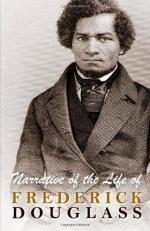I look upon my departure from Colonel Lloyd’s plantation as one of the most interesting events of my life. It is possible, and even quite probable, that but for the mere circumstance of being removed from that plantation to Baltimore, I should have to-day, instead of being here seated by my own table, in the enjoyment of freedom and the happiness of home, writing this Narrative, been confined in the galling chains of slavery. Going to live at Baltimore laid the foundation, and opened the gateway, to all my subsequent prosperity. I have ever regarded it as the first plain manifestation of that kind providence which has ever since attended me, and marked my life with so many favors. I regarded the selection of myself as being somewhat remarkable. There were a number of slave children that might have been sent from the plantation to Baltimore. There were those younger, those older, and those of the same age. I was chosen from among them all, and was the first, last, and only choice.
I may be deemed superstitious, and even egotistical, in regarding this event as a special interposition of divine Providence in my favor. But I should be false to the earliest sentiments of my soul, if I suppressed the opinion. I prefer to be true to myself, even at the hazard of incurring the ridicule of others, rather than to be false, and incur my own abhorrence. From my earliest recollection, I date the entertainment of a deep conviction that slavery would not always be able to hold me within its foul embrace; and in the darkest hours of my career in slavery, this living word of faith and spirit of hope departed not from me, but remained like ministering angels to cheer me through the gloom. This good spirit was from God, and to him I offer thanksgiving and praise.
CHAPTER VI
My new mistress proved to be all she appeared when I first met her at the door,—a woman of the kindest heart and finest feelings. She had never had a slave under her control previously to myself, and prior to her marriage she had been dependent upon her own industry for a living. She was by trade a weaver; and by constant application to her business, she had been in a good degree preserved from the blighting and dehumanizing effects of slavery. I was utterly astonished at her goodness. I scarcely knew how to behave towards her. She was entirely unlike any other white woman I had ever seen. I could not approach her as I was accustomed to approach other white ladies. My early instruction was all out of place. The crouching servility, usually so acceptable a quality in a slave, did not answer when manifested toward her. Her favor was not gained by it; she seemed to be disturbed by it. She did not deem it impudent or unmannerly for a slave to look her in the face. The meanest slave was put fully at ease in her presence, and none left without feeling better for having seen her. Her face was made of heavenly smiles, and her voice of tranquil music.




